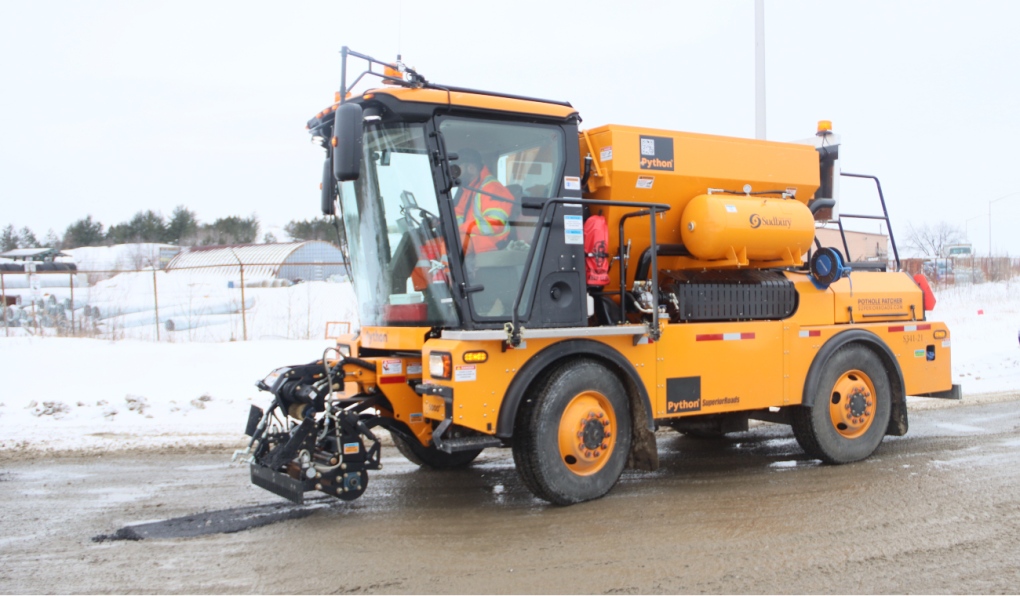Pothole machine in Sudbury offers high-quality repairs, but low production
The city’s Python 5000 does a great job repairing potholes, but it’s a high-maintenance machine that depends on weather and replacement parts to operate successfully.
That’s the conclusion of a staff analysis of the machine, which the city bought in late 2021 and began using in 2022. The goal is to make a dent in the number of potholes that emerge each year. The city repairs about 100,000 potholes every year, with more than 161,000 repairs in 2018-2019 alone.
Unlike traditional repair methods, the Python 5000 can be operated by one person and the repairs last far longer than other methods.
However, it’s a complicated machine to operate and having someone properly trained to operate it is key.
“However, operator longevity on the (Python) has been somewhat inconsistent, partly due to few employees being comfortable operating the unit in live traffic while using sophisticated controls,” the staff report said.
“Operation … by less experienced operators has led to improper patching (ex. creation of bumps and excess material being left on road), reduced productivity and equipment downtime due to improper cleaning and operation of the equipment.”
 The city’s Python 5000 does a great job repairing potholes, but it’s a high-maintenance machine that depends on weather and replacement parts to operate successfully. (File)
The city’s Python 5000 does a great job repairing potholes, but it’s a high-maintenance machine that depends on weather and replacement parts to operate successfully. (File)
It also tends to break down if crews try to drive it to outlying areas of the city.
“To mitigate this situation, the travel speed of the unit was reduced and its operation limited to the city core,” the report said.
There is also a plan in place to hire dedicated drivers to improve productivity.
Understanding that the unit requires a high degree of skill and experience for optimal operation, a dedicated operator is expected to reduce operator errors and increase familiarity, which is anticipated to result in less equipment downtime and increased utilization and productivity,” the report said.
To use it outside of Sudbury, crews will look to move it on a trailer rather than drive it all the way.
Another big challenge was getting replacement parts as the machine wore down because of supply chain issues.
“To improve this situation, fleet services have recently procured the services of local vendors to fabricate custom parts to expedite repairs,” the report said.
“Notable repairs to date included the exhaust, suspension, brakes, hydraulics, front conveyor belt and electrical components.”
'GROWING PAINS'
Joe Rocca, the city’s traffic and asset management supervisor, told city councillors Dec. 11 that productivity on the Python 5000 will improve as crews gain more experience.
“These growing pains are to be expected when incorporating new equipment and technologies into our fleet,” Rocca said.
“The number of days where we can put it to use has fallen short of what we expected,” said engineer Tony De Silva.
They consulted Thunder Bay, which also has the machine, and productivity was similar.
But with the parts issue addressed, and by hiring dedicated drivers, he expects better results next year.
“We’re going to see better results moving forward,” De Silva said.
Read the full report here.
CTVNews.ca Top Stories

Trump granted permission to seek dismissal of hush money case
A New York judge on Friday granted Donald Trump permission to seek dismissal of his hush money criminal case, in which he was found guilty earlier this year, in light of his victory in the Nov. 5 U.S. presidential election.
What economists think of Trudeau's temporary tax cut, $250 cheques
The federal government's 'meaty' move to pause federal sales tax on a long list of items and send cheques to millions of Canadians this spring could factor into an improving outlook for growth in 2025, economists say.
Queen Camilla skipping another public event as she recovers from chest infection
Queen Camilla will miss her third public engagement in two weeks as she recovers from a chest infection, Buckingham Palace said Friday.
NATO and Ukraine to hold emergency talks after Russia's attack with new hypersonic missile
NATO and Ukraine will hold emergency talks Tuesday after Russia attacked a central city with an experimental, hypersonic ballistic missile that escalated the nearly 33-month-old war.
Senior killed in dog attack in northern Ont.
An 81-year-old was killed in a dog attack this week in Bonfield, Ont. Police believe three dogs were involved.
Tracking respiratory viruses in Canada: RSV, influenza, COVID-19
As the country heads into the worst time of year for respiratory infections, the Canadian respiratory virus surveillance report tracks how prevalent certain viruses are each week and how the trends are changing week to week.
Trump chooses Pam Bondi for attorney general pick after Gaetz withdraws
U.S. president-elect Donald Trump on Thursday named Pam Bondi, the former attorney general of Florida, to be U.S. attorney general just hours after his other choice, Matt Gaetz, withdrew his name from consideration.
Son of Norway's crown princess accused of second rape
The 27-year-old son of Norway’s crown princess has been accused of a second rape just days after he was arrested on suspicion of the same offence.
Woman accused in drowning of girl at Alberta lake had been under house arrest
A bail hearing has heard that a woman accused in the drowning death of a five-year-old girl in an Alberta lake didn't know the child and was supposed to be under house arrest.

































